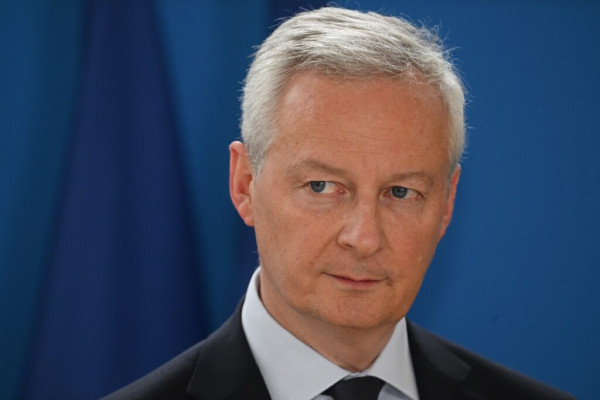Macron’s EU capital markets dream lies in tatters
BRUSSELS ― French President Emmanuel Macron's finance minister says he's "fed up with discussions" and "empty statements."
On Friday, as leaders of every eurozone country gather in Brussels for a summit about nothing very much at all, that's exactly what he's going to get. Again.
When he made those remarks last month, Finance Minister Bruno Le Maire ― talking about Macron's once-grand vision for a European capital markets union ― was hoping it would act as a rallying cry.
France yearned for an ambitious single market for capital that would get savings and investments flowing across the bloc, just like it does in the U.S., whose economy came roaring back after the pandemic.
With Europe's recovery rather more lackluster and the prospect of Donald Trump back in the White House again giving the bloc's leadership the wobbles, a properly joined-up and accessible financial sector is seen as a way of bolstering investment and beefing up economic firepower.
That dream pretty much lies in tatters.
“Political leaders at EU and national levels pay eloquent lip service to the vision of well-developed, liquid and deep capital markets” that can “perhaps eventually rival Wall Street,” Nicolas Véron, a senior fellow at Brussels think tank Bruegel, said ahead of this week’s summit. “When it comes to action, things suddenly become less awe-inspiring.”
France could go nuclear
So after the leaders of the 20-nation eurozone ensure they are smiling, slapping backs and shaking hands for the camera, the camaraderie is likely to end abruptly there. Their talks behind closed doors will be less convivial.
The plan, still barely off the ground, dates back to 2015, when the European Commission set out a blueprint to deepen financial markets and ensure that homegrown companies didn't abandon the continent to list their shares elsewhere, such as New York. It came to very little.
A decade on, Macron is signaling his desire to go nuclear and blast apart the EU's all-important unity principle and cobble together a coalition of the willing instead. One idea is to agree on legislative initiatives among like-minded nations within a legal structure called "enhanced cooperation," which requires at least nine countries.
At Friday's summit, leaders will be asked to rubber stamp a statement on the issue ― itself a year in the making ― drawn up by Eurogroup President Paschal Donohoe, who leads meetings of eurozone finance ministers.

Donohoe has had to repeatedly water down the statement, complete with a wish list of initiatives for EU capitals and the Commission's next mandate, scheduled to start at the end of this year, to find a compromise among 27 finance ministers.
The final version is light on EU supervision and heavy on deregulation to revive the bloc’s markets for asset-backed securities, attract venture capitalists and engage armchair investors. But it's hardly earth-shattering.
One of the biggest reasons for opposition is a rejection of a EU-wide supervisory regime, which the European Central Bank says is necessary for a true single capital market to function. A group of countries, led by Germany, Europe's largest economy, and Luxembourg, which hosts a huge slice of the continent's investment fund industry, is reluctant to hand more powers over to the European level, believing they are best to remain with their national watchdogs.
Critical voices over the lack of ambition have emerged since Donohoe unveiled the statement last week, especially after the ECB presented its own wishlist that called for more supervision days before.
Those voices will only embolden Paris’ plans to pursue its own agenda.
“If there is a deadlock at 27, France will propose to make progress with an enhanced cooperation on this file because we absolutely must move forward,” Macron said in January at the World Economic Forum in Davos.
It’s not the first time that Paris has threatened to use this legal structure when confronted with resistance. Two years ago, Le Maire suggested using enhanced cooperation to neutralize Hungary’s lone veto over a minimum corporate tax rate of 15 percent.
Some EU officials think Paris is bluffing and is masquerading its outrage to deflect from its heavy cuts to public spending and distract from losing the race for the EU’s future money laundering watchdog to Frankfurt.
Whatever the reason, the EU needs to turn ambition for capital markets into reality, finance commissioner Mairead McGuinness said.
“We have strong political commitment to the capital markets union project,” McGuinness wrote in an op-ed in the Financial Times this week. “Turning that into taking difficult decisions on individual measures, seeing beyond national vested interests and taking a long-term view are essential.”